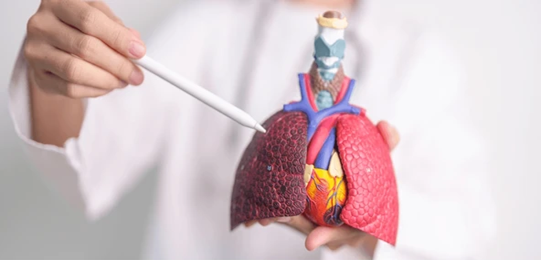- Have any questions?
- 085913 90567
- drgeorgechestdiseases@gmail.com
Smoke Lungs vs. Healthy Lungs: Understanding the Impact of Smoking on Lung Health

Is Esophageal Cancer Curable?
March 14, 2025
Thymoma vs Thymic Carcinoma: Understanding the Key Differences
April 7, 2025
The lungs are vital organs responsible for oxygenating the blood and removing carbon dioxide, which is crucial for overall health and well-being. However, smoking introduces harmful substances that can damage the respiratory system. Recognizing the differences between smoke lungs vs healthy lungs is crucial for understanding lung health and the risks of tobacco use.
Dr. George Karimundackal, an acclaimed thoracic surgeon in Mumbai, explains, “The human lungs have an incredible capacity to heal once smoking stops. While not all damage is reversible, quitting smoking is the most significant decision you can make for your respiratory health.”
Renowned for his specialization in treating lung diseases and managing complex thoracic conditions, Dr. George K has extensive experience in minimally invasive lung surgeries. He is also deeply committed to educating patients about the impact of smoking on their lung health.
Understanding the significance of healthy lungs is essential. Let’s explore their fundamental functions and how they support the body.
What are Healthy Lungs?

Healthy lungs are characterized by their efficient ability to exchange gases, supplying oxygen to the body, and expelling carbon dioxide. They are free from obstructions and inflammation, allowing smooth and unlabored breathing. Maintaining healthy lungs is essential for sustaining energy levels, supporting physical activity, and preventing respiratory illnesses.
What makes healthy lungs function smoothly? Let’s explore the key features that keep your lungs in top shape.
Characteristics of Healthy Lungs
- Colour and Appearance: Healthy lungs have a pinkish-gray hue, indicating they are free from harmful substances and well-oxygenated.
- Structure: The right lung consists of three lobes, while the left has two lobes, accommodating the heart’s position. This structure facilitates optimal respiratory function.
- Functionality: Millions of tiny air sacs called alveoli within the lungs efficiently exchange oxygen and carbon dioxide, supporting the body’s metabolic needs.
How do you know if your lungs are healthy? Let’s look at the signs that indicate optimal lung performance.
Symptoms of Healthy Lungs

- Effortless Breathing: Individuals with healthy lungs experience natural, unlabored breathing during rest and physical activity.
- Absence of Chronic Cough: A lack of persistent coughing or wheezing indicates clear airways and healthy lung tissue.
- Good Exercise Tolerance: The ability to engage in physical activities without excessive breathlessness reflects robust lung capacity and function.
Concerned about your lung health? Consult an expert to assess your respiratory condition and explore options for improvement.
Curious about the impact of smoking on your lungs? Let’s discover what happens internally when tobacco smoke is introduced.
What Happens to Your Lungs When You Smoke?

Smoking introduces numerous toxic chemicals into the respiratory system, leading to immediate and long-term damage. These substances irritate the airways, reduce lung function, and impair the body’s ability to repair lung tissue. Over time, smoking can cause irreversible harm to the lungs and overall respiratory health.
What exactly does smoking do to your lungs? Let’s break down the damage caused by tobacco smoke.
How Smoking Damages the Lungs
- Irritation and Inflammation: Smoking irritates the trachea (windpipe) and larynx (voice box), causing inflammation and discomfort.
- Reduced Lung Function: The swelling and narrowing of lung airways and excess mucus production result in breathlessness and diminished respiratory efficiency.
- Impaired Clearance Mechanism: Smoking damages the cilia, tiny hair-like structures that line the airways and help clear out mucus and debris. This impairment leads to mucus buildup and an increased risk of infections.
- Destruction of Air Sacs: The toxic substances in cigarette smoke destroy the alveoli, the tiny air sacs responsible for gas exchange, leading to conditions like emphysema.
How to spot damaged lungs from smoking? Let’s explore the symptoms you should watch out for.
Symptoms of Damaged Lungs Due to Smoking

- Chronic Cough: A persistent cough, often referred to as “smoker’s cough,” is common among smokers due to constant airway irritation.
- Shortness of Breath: Difficulty breathing during routine activities or exercise indicates reduced lung capacity and function.
- Increased Mucus Production: Excessive mucus buildup leads to frequent throat clearing and a higher risk of respiratory infections.
- Wheezing and Chest Tightness: These symptoms result from narrowed airways and inflammation caused by smoking.
Experiencing these symptoms regularly? Schedule a consultation with a lung health professional for expert assessment.
Want to see the contrast between a smoker’s lungs and healthy ones? Let’s compare the two side by side.
Key Differences Between Smoke Lungs and Healthy Lungs

- Color and Texture: Healthy lungs are pink and spongy, while smokers’ lungs often appear blackened and hardened due to tar accumulation and tissue damage.
- Elasticity: Smoking reduces lung elasticity, making it harder for the lungs to expand and contract during breathing.
- Ciliary Function: In healthy lungs, cilia effectively clear mucus and debris. Smoking damages these structures, impairing this crucial defense mechanism.
- Overall Lung Capacity: Smokers often experience a significant reduction in lung capacity compared to non-smokers, affecting their ability to perform physical activities.
How does smoking increase your risk for serious lung diseases? Let’s uncover the connections between tobacco and respiratory illness.
How Smoking Affects Lung Diseases

Smoking is a leading cause of several serious lung diseases, including:
- Chronic Obstructive Pulmonary Disease (COPD): Smoking causes damage to the lungs over time, leading to permanent conditions like emphysema and chronic bronchitis, which are components of COPD.
- Lung Cancer: Smoking is the primary cause of lung cancer, responsible for the majority of cases. The carcinogens in tobacco smoke lead to genetic mutations in lung cells.
- Respiratory Infections: Smokers are more susceptible to pneumonia and influenza due to compromised lung defense mechanisms.
Want to know how to protect your lungs from smoking-related harm? Let’s go over the best strategies to preserve your respiratory health.
Protecting Your Lungs: How to Avoid Lung Damage from Smoking

- Quit Smoking: The most effective way to prevent further lung damage is to stop smoking. Benefits begin almost immediately and continue to accrue over time.
- Avoid Secondhand Smoke: Limit exposure to environments where smoking occurs to protect lung health.
- Regular Exercise: Engage in physical activities to strengthen respiratory muscles and improve lung capacity.
- Healthy Diet: Consume a balanced diet rich in antioxidants to support lung repair and overall health.
- Regular Health Check-ups: Schedule visits with healthcare providers to monitor lung function and detect any issues early.
Conclusion
The difference between smoke-damaged lungs and healthy lungs highlights the harmful effects of smoking. By understanding these effects, individuals can take steps to improve their respiratory health. Whether you’re looking to quit smoking, assess your lung condition, or explore treatment options, professional help is readily available.
Under the guidance of Dr. George Karimundackal, patients receive expert evaluation, counseling, and treatment for lung-related conditions, including smoking-related damage.
Take the first step towards healthier lungs. Reach out to a specialist for personalized advice and support on your journey to quit smoking.
Frequently Asked Questions:
Can smoking cause immediate damage to my lungs?
Smoking can cause immediate harm by introducing toxic chemicals that irritate and inflame the airways, leading to reduced lung function.
How long does it take for the lungs to heal after quitting smoking?
Lung function improves within weeks of quitting, with significant benefits observed over months and years. However, some damage may be irreversible.
Can smoking affect other organs besides the lungs?
Smoking can harm the heart, brain, blood vessels, digestive system, and even reproductive organs.
Can passive smoke damage non smoker lungs?
Secondhand smoke can significantly impact non-smokers, though not to the same extent as active smoking.
How does lung elasticity vary in smokers’ lungs vs. healthy lungs?
Healthy lungs are more elastic, while smokers’ lungs lose elasticity, affecting breathing.
Reference links:
https://www.webmd.com/lung/healthy-lungs-smokers-lungs
https://www.medicalnewstoday.com/articles/smokers-lungs-vs-healthy-lungs
Disclaimer: This page is for informational purposes and not for promotional use.

